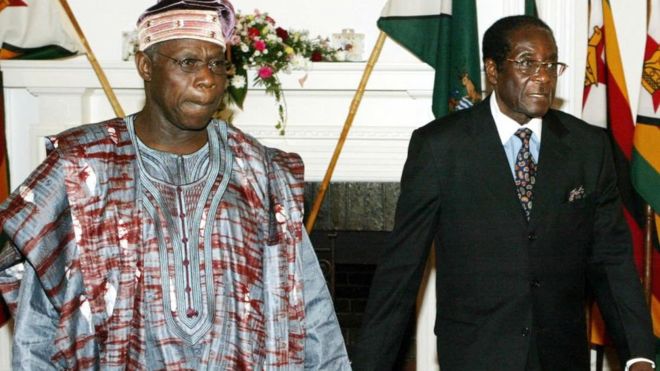By Chukwuma Chinye
From celebrated liberator to ruthless dictator, a lot has been written about Robert Mugabe and how he ran Zimbabwe into socio-economic hell for the duration of his 37 years in power. Often ignored however, is how he managed to maintain a vice like grip on power for as long as he did. Mugabe’s ability to hold on to dictatorial power in Zimbabwe for 37 years amidst local and international opposition is a considerable feat. As such, analysing the tactics he employed to rule for so long will give the reader insight into how these tactics are repeated and revised across dictatorships, particularly as it pertains to dictatorships in Africa.
The survival of the Mugabe dictatorial regime hinged on a deadly mixture of violence, patronage and ideology. During his early years as ruler, he integrated nominally democratic institutions by holding regular elections and setting up a bicameral legislature. These institutions helped him maintain power as Zimbabwe operated a one-party state and often extended political positions to potential political enemies as a means of giving them a stake in political affairs. As a consequence, Mugabe ruled almost unrivalled. However, the turn of the twenty first century saw increased local and international pressures on the Mugabe regime. The sound rejection of his constitutional referendum to extend the constitutional limits of a presidential term to an indefinite number of years only served to exacerbate the situation. (Noack, 2017) Furthermore, Mugabe’s plans to seize land owned by descendants of white farmers further alienated him from an already disgruntled population. (Noack, 2017) A situation which the newly formed Movement for Democratic Change (referred to as MDC subsequently for brevity) capitalized on to galvanize opposition to Mugabe’s reign. The steady rise of the MDC led by Morgan Tsvangirai meant that by the 2008 election, Mugabe faced for the first time in his regime, credible threats to power (Masunungure,2011). ZANU-PF lost the parliamentary and presidential elections to the MDC party in May 2008 with Tsvangirai winning more votes than Mugabe but failing to win a 50% Majority.
As such, understanding Mugabe’s continued rule of the country in the face of staunch opposition is to learn what Mugabe and the ZANU-PF had to grasp fairly quickly: true dictatorial longevity cannot be achieved by solely using nominally democratic institutions. Mugabe thus incorporated repressive and legitimization tactics to further enhance his grip on power. As a result, the Mugabe regime was decidedly more violent and manipulative post 2000 which culminated in the use of brute force in the 2008 parliamentary elections. Having failed to gain a majority for the first time in his rule, Mugabe called a run-off election and used the interim period to ruthlessly purge his political enemies with 80 opposition politicians killed and hundreds more exiled. As a result, he had a clear path to victory in the run-off elections that ensued. As horrid as these tactics are, they point out Mugabe’s understanding of the power of the democratic process. Rather than cancel elections altogether, Mugabe ensured that the democratic institutions- (the party and the electoral process,) were used solely to strengthen his position. This was only achievable through intimidation, brute force and electoral rigging and as a result, Mugabe won 85% of the popular vote. This co-potation
of democracy and repression is a hallmark of Mugabe’s regime and can be observed in other African leaders’ formulas for dictatorial longevity. A good example of this is Museveni’s use of force to suppress Bobi Wine’s electoral campaign in Uganda.
Similarly, Mugabe incorporated his position as a revered freedom fighter against the Rhodesian government to bolster his dictatorial longevity. Mugabe and the ZANU were integral to the success of the liberation struggle against the Rhodesian government. Their very name includes words denoting patriotism. As such, the ZANU-PF and Mugabe are generally regarded as staunch Zimbabwean patriots, willing to put the country first above all else. Hence, the legitimization of the Mugabe regime was already deeply entrenched in the Zimbabwean people, meaning that Mugabe could lean on his revered status for support.
The use of nominally democratic institutions, violence and Nationalism were hallmarks of Mugabe’s dictatorship; individual components which when brought together created the perfect ‘science’ of repression which enabled him to hold on to power for so long. This blend of repression has been used time and again in various corners of Africa. From Libya’s Gaddafi who ruled unchecked for 40 years to Paul Biya’s dual use of repression and appeasement in Cameroon, examples are rife of African dictators perfecting these tactics.
As for Mugabe, his hold on power finally ended when he was unceremoniously ousted by his own party in 2017, the party ZANU-PF however still controls the political climate of the country. Only time will tell if the new leader will continue the cycle of repression in Zimbabwe.


